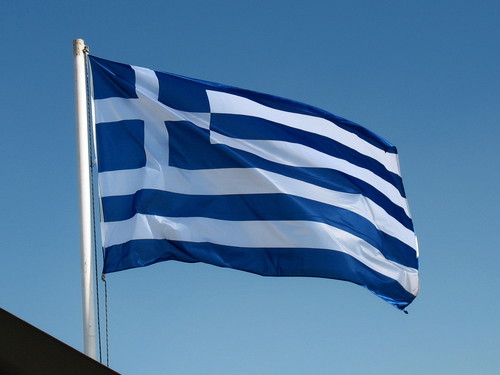
The Greeks have figured out the hard way in one week that you need cash to run an economy. Despite a big win for the left-wing Syriza government and Prime Minister Alexis Tsipras just last Sunday, the harsh reality of socialism needing other people’s money has the Greek people bankless and cashless.

Faced with extreme uncertainty, the economy here has gone topsy-turvy. Greeks are limited to ATM withdrawals of 60 euros — about $66 — a day. But they can use their bank debit cards to spend more, up to their daily limit, at stores that accept them. Some Greeks fear that the money in their accounts could be seized and devalued into a new currency if no deal is reached with Europe, so they are rushing to spend what’s there. That means a buying spree of big-ticket, imported items such as washing machines, computers, even Chanel bags.
But Greeks are largely forgoing more run-of-the-mill purchases — leaving stores such as Paul Papanikolaou’s bedding shop in central Athens battling sales drops of 90 percent since the capital controls hit. Just as well, because without the ability to make international bank transfers, he said, he is unable to bring in fresh stocks of sheets and towels from his suppliers in China and Pakistan.
“Everyone is trying to figure out how long they can last under these conditions,” he said. “It depends on when banks really open fully again. A week? Two weeks? Without some kind of normal system, some businesses won’t last a month.”
All this uncertainty – and the need for Greece to strike some kind of deal with the EU when it comes to negotiating their debts in hopes of restructuring and a new THIRD (yes, a third) bailout – drove Tsipras to first change finance ministers, then pass an austerity package early Saturday through the Greek parliament that was nearly identical to the plan that he had encouraged the Greek people to reject just last weekend.
Michael Fuchs, a senior Christian Democrat parliamentarian, said: “We have to be very careful because honestly, because I have a little bit of a problem to trust it because what is the difference between Sunday and today? On Sunday the Greek people voted against these measurements.”
Measures in the new Greek document included a tax rise on shipping company profits, phasing out extra support for pensioners, cuts in defence spending and privatisation of ports.
Along with other reforms, such as raising the retirement age from 63 to 67, and hunting out tax fraud, the Syriza government is also crossing its fingers and hoping that new tourism taxes will also help the economy generate some badly needed cash.
However, it still needs liquidity and open banks. Which is why Tsipras got this new austerity package through, in hopes of showing the EU that they are super serious about fixing this, without even paying a single euro toward the staggering debt that Greece owes – and that the EU has come to realize that they can never afford to pay back. And Germany, who must sign off on any new deal, has had enough.
German Finance Minister Wolfgang Schaeuble, who has taken a hard line on Greece over recent months, said the Greek government will have to do a lot more than just say it wants to reform if it’s going to get more money.
“We will definitely not be able to rely on promises,” he said. “We are determined to not make calculations that everyone knows one cannot believe in.”
Germany has come to realize the truth of “fool me once, shame on you; fool me twice, shame on me” and isn’t keen to be taken for a third ride. The German finance ministers have drawn up plans to put Greece on a five-year time-out from the EU if all else fails, which is being called a temporary “Grexit” from the Eurozone.
The European source was commenting on a report in the Frankfurter Allgemeine Sonntagszeitung newspaper that said the plans appeared in a one-page German finance ministry “position paper” which was handed to other member states.
The new Greek proposals for a third bailout “lack areas of important reforms,” which is why they cannot serve as the basis for a new three-year bailout programme, the ministry reportedly said.
It urged Greece to quickly improve its reform proposals and seek parliamentary support for a fund to sell 50 billion euros in financial instruments to reduce the debt burden.
If not, the paper said, Greece should leave the 19-country eurozone for at least five years and restructure its debt while remaining a member of the 28-nation European Union and receiving humanitarian aid and other support.
Negotiations will resume today between Greek representatives and the EU. The Germans seem amenable to debt restructuring, but whether they will loosen the purse strings of the EU to allow another bailout is a different question. Tsipras knows this, which is why the austerity package was pushed through, even after the referendum. It remains to be seen how the Greek people are going to react to the new austerity package and any agreement about debt structuring and bailout. Have two weeks of living without bank access changed any minds? Has the thought that the government could just seize all bank accounts for a “bail-in” finally sunk in? Are they happy with living with the same kinds of grocery shortages as a third-world country?
Are the Greek people desperate enough to finally admit that socialism and pride won’t get them through this? We will have to wait and see.
Leave a Reply